Pure Pop Progeny #2: "The One and Only" Chesney Hawkes, Chrysalis Records, 1991
His father was in a hit '60s pop band, and his own worldwide hit was written by another hitmaking rock star! Plus, he's released 4 studio albums.
This is the second in the series, “Pure Pop Progeny,” where we dig deep into the musical career of an artist who’s…yep…the pure pop progeny of a previously prominent entertainment/show biz star!
“Pure Pop Progeny #1” uncovered the little-known recording career of Steve March-Tormé, son of singing/drumming/composing/arranging jazz-pop legend, Mel Tormé, “The Velvet Fog”:

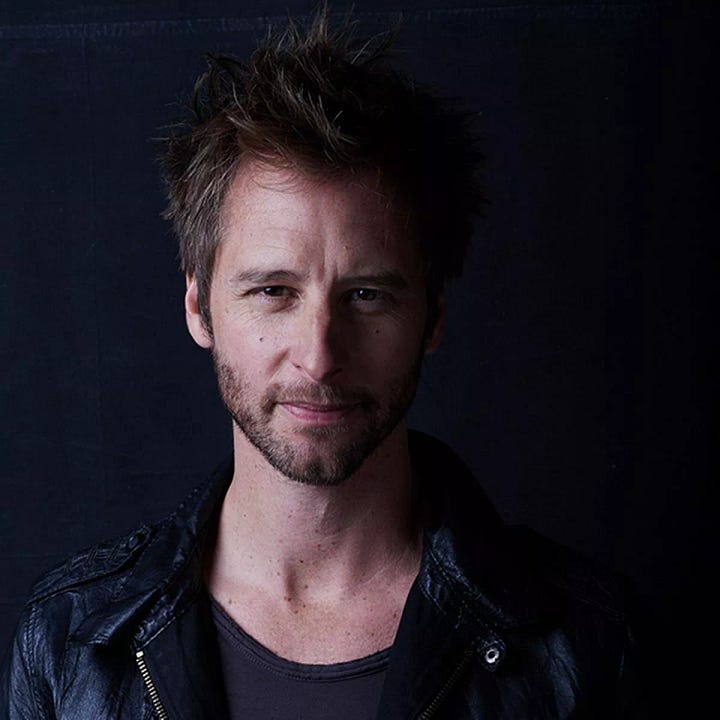
For “Pure Pop Progeny #2,” we introduce and his famous rockin’ dad:
If you’re not familiar with him or the song, you might as well experience what most of America—and, to some degree, Europe (although they had an accompanying movie to pave the way)—experienced in the early spring of 1991, in real time:
He was 19, looked 16, and came from out of nowhere in 1991, with a song that boldly pronounced that he, apparently, was “The One and Only”! The days of teenybop stars were long gone, Guns N’ Roses had announced their Axl Rose-y presence, “grunge” had erupted in all its flannel finery, and MTV was in the initial throes of attempting to ditch videos as their cable M.O.
And, the boy-band scare was still a couple years away.
What the hell was he thinking? Was his label, Chrysalis, throwing him to the wolves, while risking his target audience (and, who on earth could that be in this musically metallic milieu)?
Chesney Lee Hawkes was born in Windsor, Berkshire, England, on September 22, 1971. While not necessarily “rock royalty,” ensuring his place in rock’s pantheon, he did have an in: His father. Len “Chip” Hawkes joined The Tremeloes in 1966 as bassist and vocalist.
The Tremeloes enjoyed worldwide hits, including Cat Stevens’ “Here Comes My Baby” (above video, #4 on UK Singles Chart, #13 U.S.; Chip Hawkes is down-stage center, playing bass in fringe jacket), “Silence is Golden” (written by Bob Crewe and Bob Gaudio, #1 UK, #11 U.S.; in video below, Chip is on the left, playing bass, and the one pictured on the video thumbnail), “Even the Bad Times Are Good” (written by Pete Callander and Mitch Murray, #4 UK, #36 U.S.), and several other Top 40 hits until Chip left the band in 1974 after being injured in a car crash.
The Hawkes Enter the MTV Generation
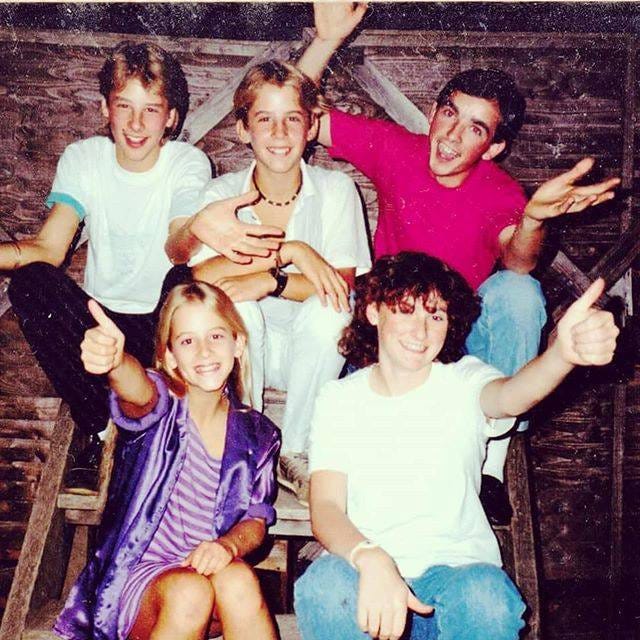
Buddy’s Song Begets Chesney’s Song

Chesney starred with The Who’s lead singer, Roger Daltrey, in 1991’s Buddy’s Song, a theatrical release directed by Claude Whatham. It enjoyed wide release in the UK and Europe, but saw few U.S. screens.
Chesney plays Buddy, an aspiring teenage musician who’s feeling the pressure to go further than his Dad in his ‘60s teddy boy rocker days. When his father is sent away for a year covering for a criminal, it puts further strain on the family relationship. Meanwhile, Buddy’s career gathers steam.
Buddy’s Song, the movie’s soundtrack album on Chrysalis Records, served as Chesney’s debut album in Europe. In the U.S., his Chrysalis debut was dubbed, The One and Only.
I am the one and only
Nobody I’d rather be
I am the one and only
You can’t take that away from me—Nik Kershaw
Just in the Kershaw of Time
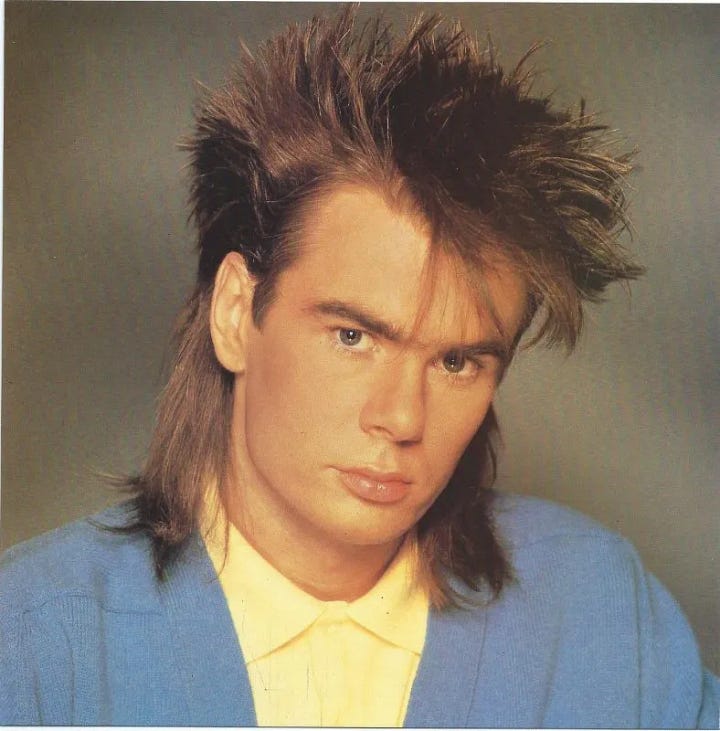
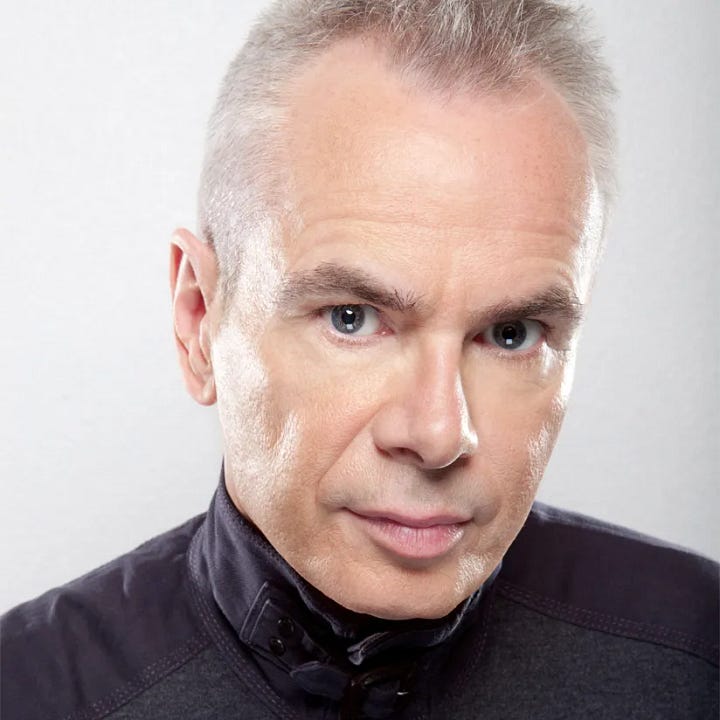
“The One and Only” was produced by Alan Shacklock (who also arranged) and Nik Kershaw, and recorded at Abbey Road Studios. Kershaw, like Hawkes, a British singer/songwriter/recording artist in his own right, began his recording career in earnest in 1984.
He released eight singles that entered the Top 40 of the UK Singles Chart during the decade (YouTube videos of each, linked): “Wouldn’t It Be Good,” “Dancing Girls,” “I Won’t Let the Sun Go Down on Me,” “Human Racing,” “The Riddle,” “Wide Boy,” “Don Quixote,” and “When a Heart Beats.” His 62 weeks on the UK Singles Chart from 1984 through 1985 beat all other solo artists, according to the 2006 British Hit Singles & Albums.
There’s no available Kershaw demo of the song, and he never recorded it himself. But, we do have a live performance from 2012: Let’s call it a “post-hit demo” in retrospect! Any pre-hit nuances Nik might’ve employed are unknown, as he’s basically fully utilizing, here, Shacklock’s hit Chesney arrangement (completely understandably):
Trying to figure out “just where ‘The One and Only’ could’ve come from,” and taking Kershaw’s hit singles (and their attendant videos) into account, it all seems to make sense: Bouncy, melodically catchy tunes all appropriately set to the ‘80s scene-centric milieu of the music video decade:
Nik seemed perfectly comfortable in the theatrical element of the MTV format, with some videos completely enveloped in the cinematic sweep of a feature film: Two-minute intros to set the scene, unfolding plotlines (however loosely), and Nik with his white Capezios, that distinctive herky-jerky dancing that (for some reason) prevailed over the decade, and of course, the funny hairdos!
All that culminated, unsurprisingly, in a soaring, celebratory 1991 pop anthem to open the new decade. Fewer than a dozen artists have covered the song in its 3 1/2-decades of life. And, like so many lightning-strike songs that hit a particular artist at one particular time, “The One and Only” clearly defined a career.
And, there’s no one he’d rather be.
Pure Pop Progeny, Pt. 2
Chesney is married to his American wife, Kristina, and they lived in Los Angeles at the time of this writing. They’re parents to Casey, Jesse, and Indi. And, of course, they sing!
Performing at the Rewind Festival, 2013, with the songwriter, himself, on guitar:
A flashmob (remember those?) assembles in Manchester, 2014:

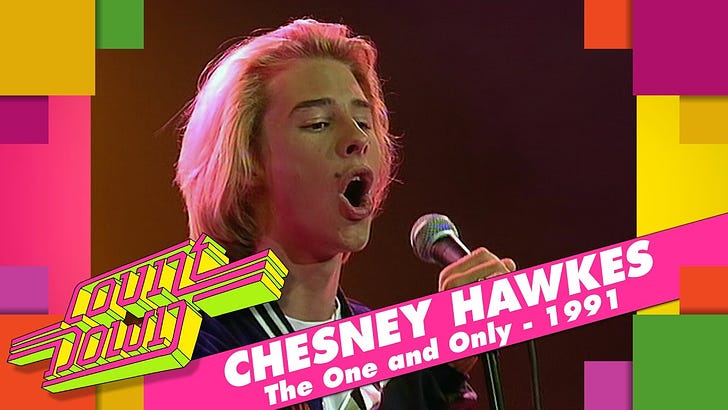


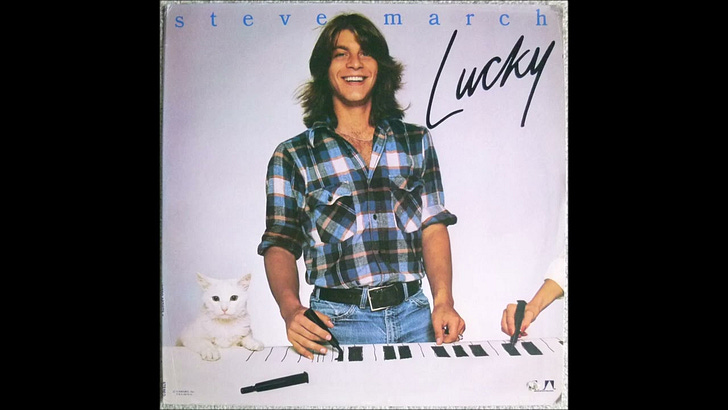
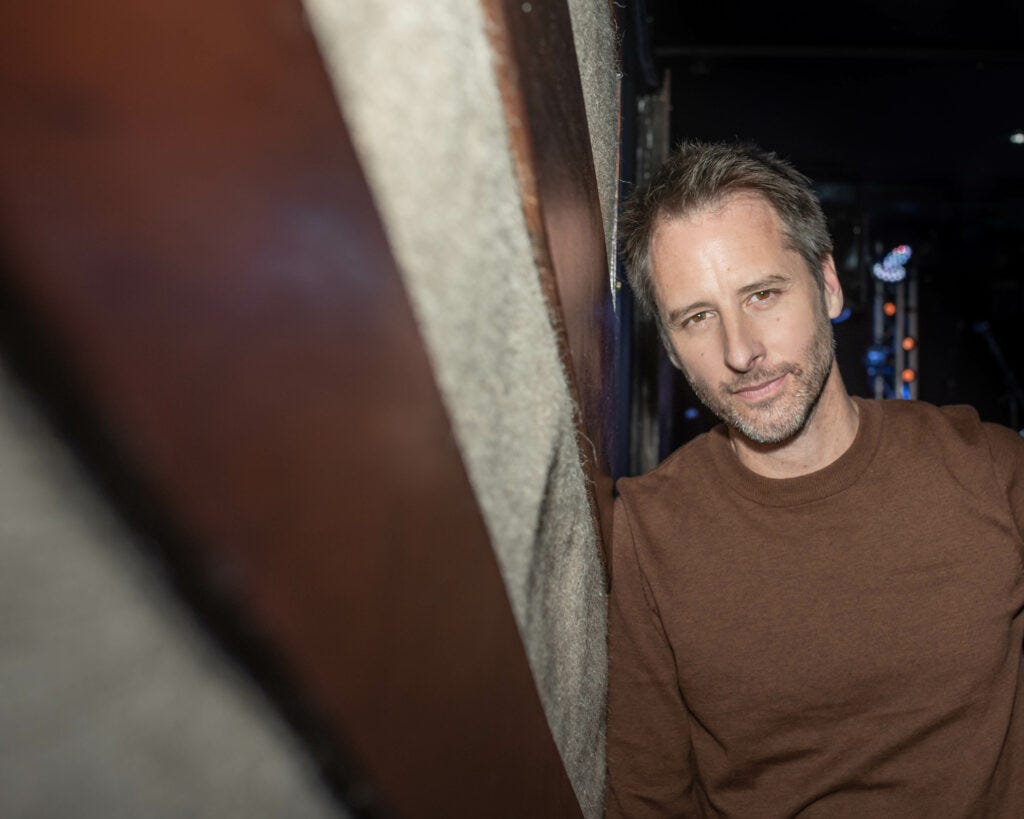


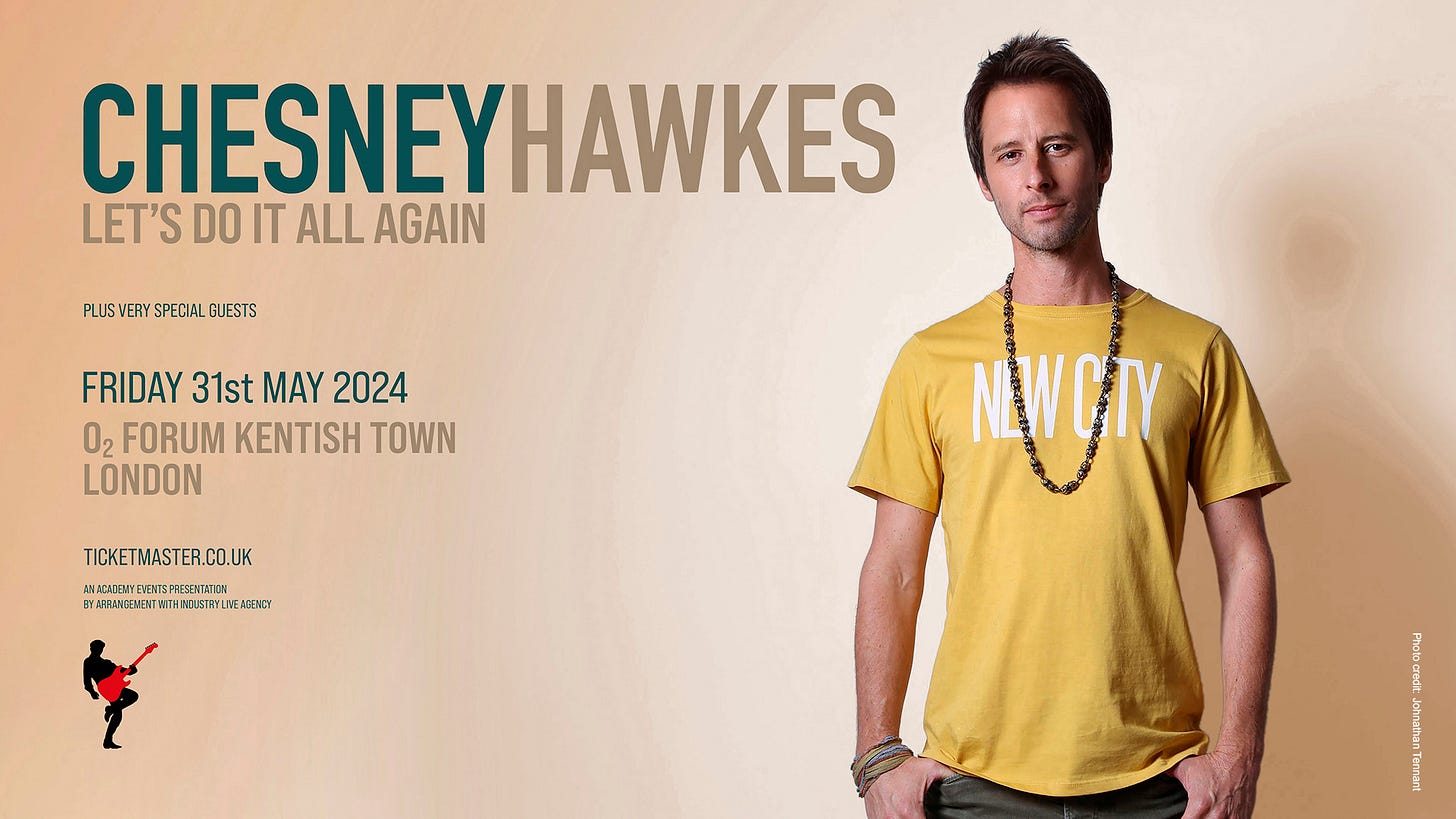
Great piece! I always find these US/UK differences very interesting: popularity and market trends, of course, but on a related (and much nerdier, admittedly) point: different album editions! Correct me if I am wrong but I feel this was quite common in the early 90s with some pop releases: depending on where the artist originated from, the packaging, track list, and sometimes even the mixes were different across the US and UK markets!
Another thing I noticed is different UK vinyl cover art in early/mid 60s records by US artists (Aretha comes to mind). I’ve always wondered why.
Fun fact: It was the Tremelos that Decca chose to sign over The Beatles after the infamous Decca audition.